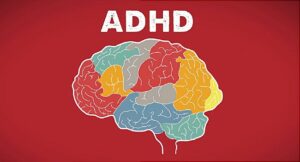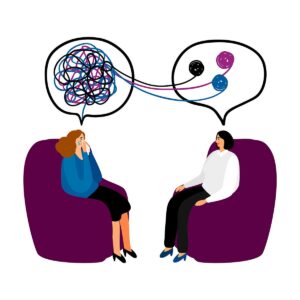Did you know that there is a strong relationship between PTSD and ADHD? In fact, up to 50% of people who have ADHD also have PTSD. And, up to 60% of people who have PTSD also have ADHD. This can be a difficult combination to deal with, as both disorders can affect your daily life in different ways. In this blog post, we will discuss the relationship between these two disorders and how they can affect each other.
Contents
Understanding PTSD And ADHD
 ADHD is a mental disorder that is characterized by problems with focus, hyperactivity, and impulsiveness. PTSD is a mental disorder that can develop after a person has experienced or witnessed a traumatic event. Both PTSD and ADHD are common mental disorders that can have a significant impact on a person’s life.
ADHD is a mental disorder that is characterized by problems with focus, hyperactivity, and impulsiveness. PTSD is a mental disorder that can develop after a person has experienced or witnessed a traumatic event. Both PTSD and ADHD are common mental disorders that can have a significant impact on a person’s life.
There is a growing body of research that suggests that PTSD and ADHD are linked. Some studies have found that people with PTSD are more likely to also have ADHD. Other studies have found that people with ADHD are more likely to develop PTSD after exposure to a traumatic event.
So, both conditions are basically mental disorders that can exist together. It’s important to understand how each one affects the other in order to provide better treatment for both conditions. Also, people might get one disorder and then the other, so it’s important to be aware of that as well.
Symptoms Of PTSD And ADHD
There are a variety of symptoms that are associated with both PTSD and ADHD. It is important to note that not everyone will experience all of the symptoms and some people may experience different symptoms than others.
The most common symptoms of PTSD include:
- Intrusive thoughts or memories
- Flashbacks
- Nightmares
- Emotional numbness
- Avoidance of people, places, or things associated with the trauma
- Anxiety
- Depression
- Anger
- irritability
The most common symptoms of ADHD include:
- Inattention
- Hyperactivity
- Impulsivity
It is not uncommon for someone to experience both PTSD and ADHD. In fact, research suggests that up to 50% of people with ADHD also suffer from PTSD. The two conditions can interact and exacerbate each other, making it difficult to manage both disorders.
If you think you may be suffering from PTSD or ADHD, it is important to seek professional help. A trained mental health professional can help you to understand your symptoms. And develop a treatment plan that is right for you.
Link Between The PTSD And ADHD
 It is believed that there is a strong link between PTSD and ADHD. Both of these mental disorders can have a negative impact on an individual’s life. Although both are believed to share some similarities, there are also some key differences between the two.
It is believed that there is a strong link between PTSD and ADHD. Both of these mental disorders can have a negative impact on an individual’s life. Although both are believed to share some similarities, there are also some key differences between the two.
Similarities
There are some key similarities between PTSD and ADHD. These include:
Lack of focus- It is believed that both PTSD and ADHD can cause an individual to have a lack of focus. This can make it difficult for them to concentrate on tasks and may lead to them feeling overwhelmed.
Impulsivity- Both conditions are also linked with impulsivity. This means that those who suffer from either condition may act without thinking, which can lead to dangerous or risky behavior.
Hyperactivity- Individuals with either PTSD or ADHD may also experience hyperactivity. This can make it difficult for them to sit still and may cause them to be constantly on the go.
Social challenges – There are also social challenges that come with both of these mental disorders. Those who suffer from PTSD or ADHD may find it difficult to interact with others, which can lead to social isolation.
Differences
Although there are some similarities between PTSD and ADHD, there are also some key differences. These include:
Intrusive thoughts- One of the main symptoms of PTSD is experiencing intrusive thoughts, which are unwanted and often disturbing thoughts. People with ADHD may also have intrusive thoughts, but these tend to be less distressing and more related to their current line of thinking.
Hypervigilance- Hypervigilance is when someone is constantly on the lookout for threats, even when there is no evidence that one exists. This can lead to feelings of paranoia and anxiety. People with ADHD may also be hypervigilant, but this is usually due to their impulsivity and lack of focus.
Flashbacks- Flashbacks are a symptom of PTSD where the person relives the traumatic event in their mind. And, on the other hand, people with ADHD may also have flashbacks, but these are usually less intense.
So, these are some common similarities and differences between PTSD and ADHD. It’s important to remember that everyone experiences these disorders differently, so don’t hesitate to reach out for help if you’re struggling.
How Do PTSD And ADHD Impacts Life?
 PTSD and ADHD are already being diagnosed at epidemic rates, with an alarming number of children being affected. But how does PTSD specifically impact those with ADHD? There are a few key ways in which PTSD and ADHD can interact and affect each other.
PTSD and ADHD are already being diagnosed at epidemic rates, with an alarming number of children being affected. But how does PTSD specifically impact those with ADHD? There are a few key ways in which PTSD and ADHD can interact and affect each other.
For one, people with ADHD tend to be more impulsive and have difficulty controlling their emotions. This can make it harder for them to cope with the symptoms of PTSD, which can include intrusive thoughts and flashbacks. Additionally, people with ADHD may be more likely to self-medicate with drugs or alcohol in an attempt to numb their symptoms.
Moreover, there are several negative impacts that PTSD and ADHD can have on our life. These include:
- Difficulty concentrating
- Inability to focus
- Irritability
- Poor sleep quality
- Heightened anxiety levels
All of these factors can make it difficult to maintain a job, keep up with schoolwork, or even just function on a day-to-day basis. It’s important to seek help if you or someone you know is struggling with PTSD and ADHD. With treatment, it is possible to manage both disorders and improve your quality of life.
How To Treat?
It is important to seek help if you think you may have PTSD or ADHD. Many people with these disorders don’t seek treatment because they don’t know they have a problem. So here are a few treatment options for both PTSD and ADHD, these include:
Psychotherapy
 This is also known as talk therapy. It’s a way to help you process your feelings and emotions related to your trauma. You can do this with a therapist one-on-one, or in a group setting. There are different types of psychotherapy, but all of them aim to help you understand your thoughts and feelings so you can manage them better.
This is also known as talk therapy. It’s a way to help you process your feelings and emotions related to your trauma. You can do this with a therapist one-on-one, or in a group setting. There are different types of psychotherapy, but all of them aim to help you understand your thoughts and feelings so you can manage them better.
- Cognitive-behavioral therapy (CBT): This is a type of therapy that helps you change the way you think about your trauma. It can also help you change your behavior. For example, if you have PTSD, you may avoid people or places that remind you of your trauma. With CBT, you can learn to face your fears so they don’t control your life.
- Exposure therapy: This is a type of CBT. It helps you slowly and safely confront the things that make you anxious. For example, if you have PTSD, you may be afraid to leave your house. With exposure therapy, you would work with a therapist to gradually expose yourself to the things that make you anxious. The goal is to help you feel better and function better in your everyday life.
With therapy, it is possible to live a normal and fulfilling life despite having PTSD or ADHD.
Medication
There are many types of medication that can be used to treat PTSD and ADHD. The type of medication will depend on the symptoms you are experiencing.
For PTSD, medications such as antidepressants, anti-anxiety medications, and antipsychotics may be prescribed.
For ADHD, medications such as stimulants, non-stimulants, and antidepressants may be prescribed.
It is important to talk to your doctor about the potential risks and benefits of taking medication for PTSD or ADHD. Also, it is important to understand that not all medications work for everyone. But with the right help and support, you can find a medication that works for you.
Support Groups
It is believed that nearly 70% of people will experience a traumatic event at some point in their lives. Of those individuals, it is estimated that 20% will go on to develop Post-Traumatic Stress Disorder (PTSD). While PTSD can affect anyone, recent studies have shown that those with Attention Deficit Hyperactivity Disorder (ADHD) are more likely to experience symptoms of PTSD.
There are a number of support groups available for both PTSD and ADHD. However, due to the overlap of symptoms, it can be difficult to find a group that specifically addresses both disorders. The best way to find a group is to ask your doctor or mental health professional for recommendations.
Herbal Supplements
Herbal supplements are believed to help with a variety of mental disorders. They are natural and do not have the same side effects as medications. Some people with PTSD and ADHD use herbal supplements to help with their symptoms.
There are a few different types of herbs that are commonly used to treat mental disorders. Some of these include:
- St. John’s Wort
- Chamomile
- Lavender
- Valerian Root
Each person is different and will respond to different herbs in different ways. It is important to talk to a doctor before taking any herbal supplements, as they can interact with other medications.
Some people with PTSD and ADHD find that herbal supplements help them to feel better and manage their symptoms. Others find that they do not work well for them. It is important to experiment and find what works best for each individual.
Self-Help Strategies
 There are a number of things you can do to help manage comorbid PTSD and ADHD. Some of these things include:
There are a number of things you can do to help manage comorbid PTSD and ADHD. Some of these things include:
- Educating yourself and your loved ones about both disorders
- Sticking to a daily routine as much as possible
- Eliminating distractions and clutter from your environment
- Breaking tasks down into smaller, manageable pieces
- Creating a support network of friends, family, or mental health professionals
With proper understanding and self-care, it is possible to manage both PTSD and ADHD. If you find yourself struggling, do not hesitate to reach out for help.
If you have comorbid PTSD and ADHD, self-care is crucial along with understanding your disorders. Trauma and ADHD can be a lot to manage but it is possible with the right support network and self-care routine.
Conclusion
To conclude, PTSD and ADHD are two mental disorders that can have a profound effect on each other. If you or someone you know suffers from either of these conditions, it is important to seek professional help. With treatment, it is possible to manage both the conditions and improve your quality of life.
It’s also worth noting that not everyone who has PTSD will also have ADHD, and vice versa. However, research does suggest that there is a strong relationship between the two conditions. If you have one, you may be more likely to develop the other. Therefore, it’s important to be aware of both disorders and their symptoms.
For more information, please contact MantraCare. ADHD is a neurodevelopmental disorder characterized by difficulty in paying attention, hyperactivity, and impulsivity. If you have any queries regarding Online ADHD Counseling experienced therapists at MantraCare can help: Book a trial ADHD therapy session


